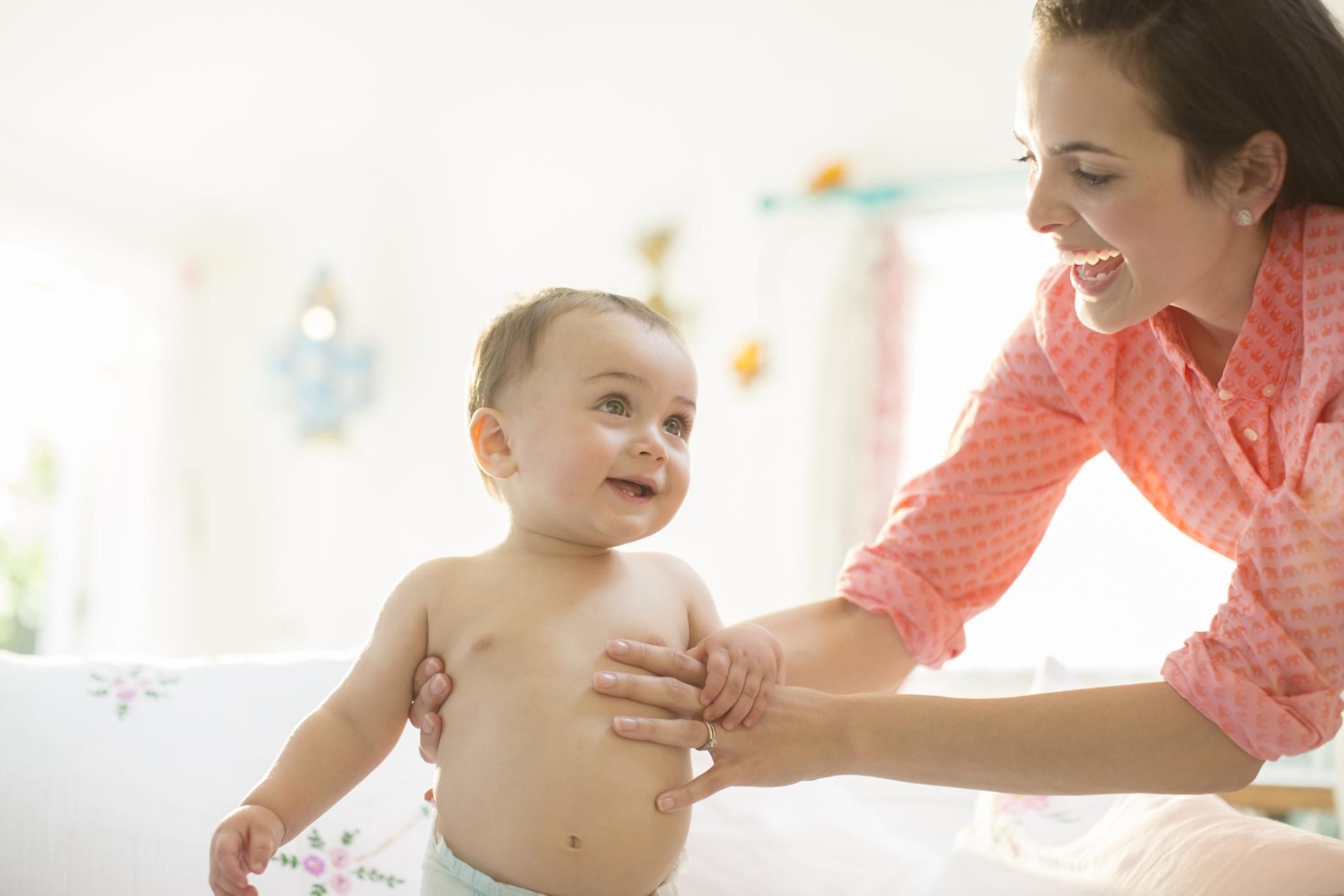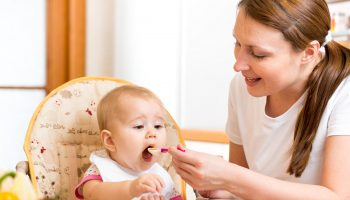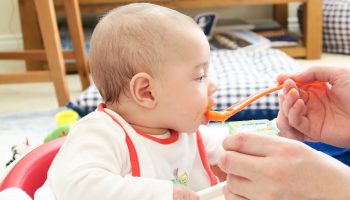
Your baby will keep you on your toes in the next few months. Infant development milestones for a 10- to 12-month-old include crawling and improved hand-eye coordination.
Some pretty weird behavior problems may pop up around now, including head banging, rocking, rolling, teeth grinding, and hair pulling. While no one’s exactly sure what’s behind such (generally nonhazardous) behaviors, they may simply be a way of blowing off steam and are often triggered or increased by stress. What else is baby up to? She may be biting you or Daddy or her big sister — definitely a habit to nip in the bud. She may also become fearful of things she never feared in the past, like the vacuum cleaner or your neighbor’s pooch. As for you and Daddy, now’s a good time to build a united front when it comes to discipline as your baby’s desire to do her own (possibly dangerous or hurtful) things will only grow as she does. You’ll no doubt get plenty of opinions on spanking and determine that physical punishment is never an effective way to discipline a child.
Contents
What to expect
From ages 10 to 12 months, your baby is likely to enjoy:
Improved motor skills
Most babies this age can sit without help and pull themselves to a standing position. Creeping, crawling and cruising along the furniture will eventually lead to walking. By 12 months, your baby might take his or her first steps without support.
Better hand-eye coordination
Most babies this age can feed themselves finger foods, grasping items between the thumb and forefinger. Your baby might delight in banging blocks together, placing objects in a container and taking them out, as well as poking things with his or her index finger.
Evolving language
Most babies this age respond to simple verbal requests. Your baby might become skilled at various gestures, such as shaking his or her head no or waving bye-bye. Expect your baby’s babbling to take on new inflection and evolve to words such as “dada” and “mama.” You might hear certain exclamations, such as “uh-oh!”
New cognitive skills
As your baby’s understanding of object permanence improves, he or she will be able to easily find hidden objects. Although your leaving the room might lead to crying, your baby will begin to realize that you still exist even when you’re out of sight. You might find your baby imitating you by brushing his or her hair, pushing buttons on the remote control or “talking” on the phone.
Food
Around now, or very soon, your baby should be reaching the third stage of weaning, which involves three balanced meals a day and food that’s minced or chopped rather than puréed, to aid development of their chewing and swallowing skills, and speech, too! Giving your baby a wide variety of foods now – including lots of different sorts of fruit and vegetables – will make your baby more receptive to different tastes as they gets older, and might even help you avoid ‘fussy eater’ syndrome later on! There’s lots more info in our guide to weaning
Your baby may be less inclined to drink milk with all this solid food they’re getting, but they still need their daily quota of milk – 500 to 600ml of formula, or a couple of breast feeds. If you’re worried they’re not getting this, don’t forget that you can include any milk (or milk products) used in cooking in this quota. And if they’re getting much more than that, and it’s affecting their appetite for solid food, aim to cut down to the recommended limit – you might have to offer cuddles or some other distraction in place of one or more milk feeds, if it’s a habit your baby is reluctant to drop. Current guidance suggests some babies are getting too much milk which may be a contributing factor in rising obesity rates in children, so do not exceed 1 pint a milk a day, including milk added on or in food (eg. cereal).
As well as meals and regular milk feeds, your growing and increasingly active baby will need some healthy snacks to keep them going in between. As most mums know, a well-timed snack can make the difference between a grumpy baby and a happy baby, so don’t go anywhere without something edible in your bag. Healthy options are fruit and raw veg, rice cakes, bread sticks and pitta, cheese, and oatcakes. Dried fruit, whilst it has some nutritional value, is also very high in sugar and, for the sake of their teeth, best given with meals rather than as snacks.
Abilities
Play and Social Skills
- Is interested in interacting with others (such as peek a boo)
- Maintains eye contact with people during playful interactions
- Raises hands to be picked up
- Turns head in response to name being called
- Points to objects of interest by 12 months
- Enjoys playing with toys of varied textures
- Enjoys playing and banging musical toys
- Enjoys various types of movement, such as being gently swung in the air by parents
- Frequently explores the environment when placed on floor
- Enjoys moving to get a desirable toy
Coordination
- Moves in and out of various positions (e.g. crawling, climbing, cruising, and walking) to explore environment and get desired toys
- Keeps head forward when being pulled to sitting from lying on back
- Is able to pull self to stand
- Is able to hold head upright while crawling by 11 months
- Primarily crawls or walks to get desired objects
- Puts weight through hands or feet when moving in and out of positions and while supported in standing
- Is able to sit unsupported and turn head to look at objects without losing balance
- Is able to throw balls and maintain balance
- Uses both hands equally to play and explore toys
- Is able to clap hands
- Enjoys and seeks out various ways to move and play
Daily Activities
- Usually enjoys bath time
- Is able to self calm in car rides when not tired or hungry
- Is usually able to tolerate diaper changing without crying
- Is not fearful of tipping head back when moving from sitting to lying on back
- Is able to use fingertips to pick up small objects, such as small pieces of food
- Is eating an increasing variety of food
- Can usually participate in dressing without becoming upset
- Has an established sleep schedule
- Is usually able to calm self to fall asleep
Self-Expression
- Is comforted by cuddling and a parent’s touch
- Has grown accustomed to everyday sounds and is usually not startled by them
- Is generally happy when not hungry or tired
- Is able to calm with experiences such as rocking, touch, and calm sounds
- Is able to enjoy a wide variety of touch, noise, and smells
- Cries and notices when hurt
- Is able to self soothe when upset
Playtime with your baby
Now that your baby is old enough to really make the most of them, you might be on the lookout for new toys and activities to stimulate and entertain your little one. Don’t bother to buy new – check out your local toy library charity shops, boot sales. You could also look on Freecycle, a great community website that allows people to give and receive unwanted stuff rather than taking it to the tip. Be sure to check second-hand toys regards safety.
Sometimes though, the best fun of all can be had with nothing more than a little imagination and stuff that you’ve already got lying around at fun. There’s more on playtime with your baby here or how about creating your own treasure baskets, a wonderful way to keep little ones entertained.





